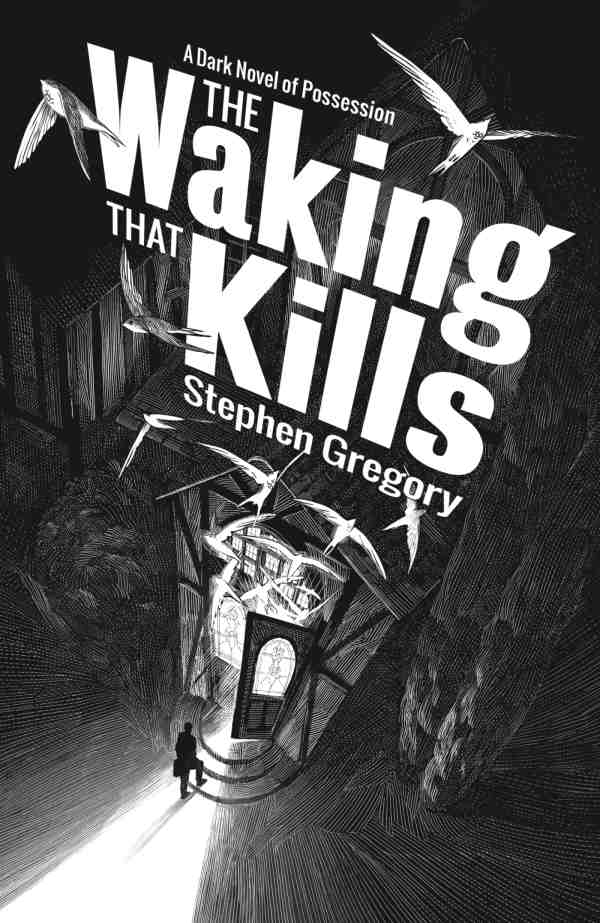The Waking That Kills



‘A first class terror story with a relentless focus that would have made Edgar Allan Poe proud.’
New York Times
on
The Cormorant
‘Gregory writes with the hypnotic power of Poe.’
Publisher’s Weekly
‘Gregory’s voice and vision are wholly original.’
Ramsey Campbell
‘Intelligent and well-written.’
Iain Banks on
The Cormorant
‘A considerable delight... the quality of the prose and the economy of expression are particularly impressive.’
Time Out
on
The Cormorant
‘An extraordinary novel - original, compelling, brilliant.’
Library Journal
on
The Cormorant
First published 2013 by Solaris
an imprint of Rebellion Publishing Ltd,
Riverside House, Osney Mead,
Oxford, OX2 0ES, UK

ISBN (epub): 978-1-84997-646-6
ISBN (mobi): 978-1-84997-647-3
Copyright © 2013 Stephen Gregory
Cover art by Nicolas Delort
The right of the author to be identified as the author of this work has been asserted in accordance with the Copyright, Designs and Patents Act 1988.
All rights reserved. No part of this publication may be reproduced, stored in a retrieval system, or transmitted, in any form or by any means, electronic, mechanical, photocopying, recording or otherwise, without the prior permission of the copyright owners.


for Broo Doherty at Wade & Doherty
and Jonathan Oliver, Solaris

Prologue
‘L
AWRENCE
L
UNDY,
’
MY
father said, blurring the words oddly in his mouth.
Then, to try and remember where he’d heard the name before, he pretended, with an invisible chisel in one hand and an invisible hammer in the other, to carve it onto an invisible gravestone. He stared at the empty space, reading and re-reading the letters as he cut them.
This time it didn’t come back to him.
He’d always said he had a head for names: he’d been a monumental mason for forty years, staring at a name for hours on end as he cut it into the stone. He claimed he could remember exactly where and when he’d carved each one.
But this one wouldn’t come.
‘Lawrence Lundy,’ he said, and he started to carve the name again, shaping each letter with his lips as he tapped it carefully, painstakingly, into thin air with his invisible tools.
I told him it didn’t matter, but he ignored me. He carried on working, in the same way he’d ignored me when, as a boy, I’d sat with him on a frosty morning in a country churchyard or a hot afternoon in a military cemetery. I watched him. He seemed to have forgotten I was there, although I’d flown over seven thousand miles to visit him. I imagined I could hear in my head the knock of the hammer on the handle of the chisel, the nick of the blade into stone.
The room was small and stuffy, already cluttered with the few books and pictures he’d managed to bring with him. It smelled of him and his clothes, although he’d been there less than a fortnight and the window was wide open. There was an impressive view: the nursing-home was on the promenade and his room was on the top floor. For a man who’d worked outside since the day he’d left school, suddenly confined in such a narrow space, it was good that he’d be able to breathe the sharp salt air and watch the changing moods of the estuary.
Now, quite oblivious of me, he was still chipping away. He was tall and very thin, all bumpy joints and jutting angles; strong fingers with swollen knuckles, horny nails, glasses slipping to the end of a bony nose... my stricken father, mouthing the letters of a name he’d heard somewhere but couldn’t quite remember.
He looked very tired. His face, indeed his whole demeanour, was lop-sided. He’d tried talking to me, but his tongue was wet and heavy. He’d listened to my brief account of another year overseas and my plan for the summer. When I told him I was going to stay not far away, that I’d taken a tutoring job for a couple of months and could come into town by bus to see him every week, he’d rummaged in his bedside drawer and pulled out a ring of keys.
‘Use the car,’ he mumbled, and when he saw me wince at the suggestion, he shrugged and added, ‘See if she’ll start, take her round the block a couple of times, it’s up to you.’ He pressed the keys into my hand, and in doing so he held my fingers between his. ‘So soft,’ he smiled, ‘not a day’s work in all your life.’
His eyes were drooping. A trickle of saliva shone on his chin. I stood up and made softly for the door, meaning to let myself out and tiptoe down the corridor.
But he heard me and shook himself awake again. He stared at me as though I’d just come into the room and he didn’t know who I was. Startled, smearing at his mouth with the back of his hand, he tried to say that name again. For a moment, as he blinked at me in bewilderment, he seemed to think that I, a stranger he’d never seen before, was Lawrence Lundy. And suddenly – I could see from a flicker of fear in his eyes – suddenly he remembered the name... yes, he knew it, he’d seen it somewhere, he’d read it somewhere, and at last it had come back to him.
But his tongue and his lips refused to work. He writhed in his chair, infuriated, impotent.
‘No, Dad, it’s me,’ I said, ‘it’s me, it’s Christopher,’ and I moved across the room again, to try and calm him.
He recoiled from my touch. His face twisted into a grimace of revulsion. ‘Bad boy... bad boy...’ he was blubbering through numb, wet lips, and he squirmed away from me.
I left. And as I closed the door and moved along the corridor, I could still hear him trying to get the words out, spluttering with anger and frustration.

Chapter One
I
WALKED ALONG
the promenade, past holiday hotels, bed-and-breakfasts and old people’s homes. I reached the town and turned into a narrow side-street. The air was shrill with the ill-tempered cries of gulls, and the sky was grey and cold, lowering onto the chimneys and slatey rooftops of the town.
I felt fidgety in England after more than a year away. It prickled on me. It was an itchy old coat I hadn’t worn for a long time, unwashed, stale, with forgotten oddments mouldering in its pockets. In five minutes, I saw things I’d never seen in the gently complacent country I’d left behind: homeless teenagers huddled in blankets, a drunken woman yelling in a pub car park, a man in an ugly confrontation with a traffic warden, shop doorways blocked by bags of rubbish, the pavement sticky with chewing-gum. I rounded a corner into a cobbled alley and came to my father’s lock-up garage. As soon as I slotted the key into the big padlock, snicked it easily and then withdrew the key with a sheen of oil on it, I knew that the car would start and I’d have no choice but to roll it out and drive it dutifully, foolishly, around the town for a mile or two.
I swung the garage door up and open. The car bulged out of it, huge and slabby, mottled grey, like the carcase of a whale.
